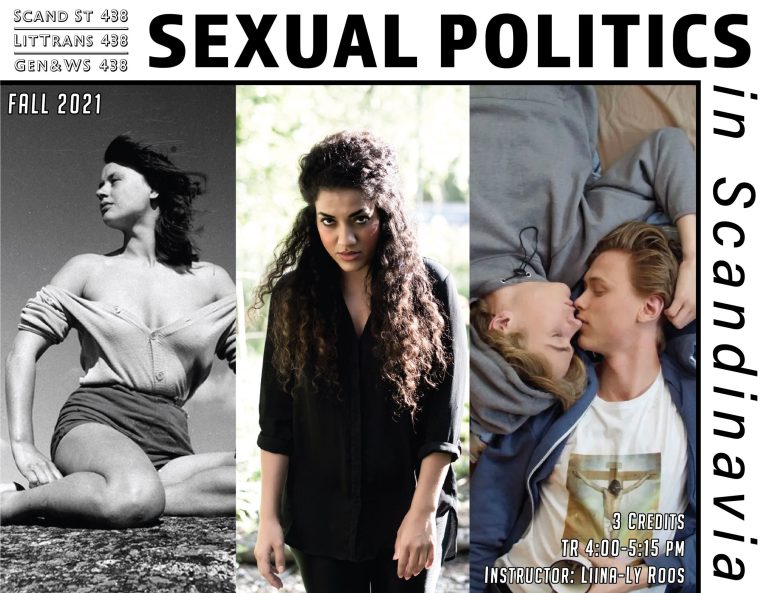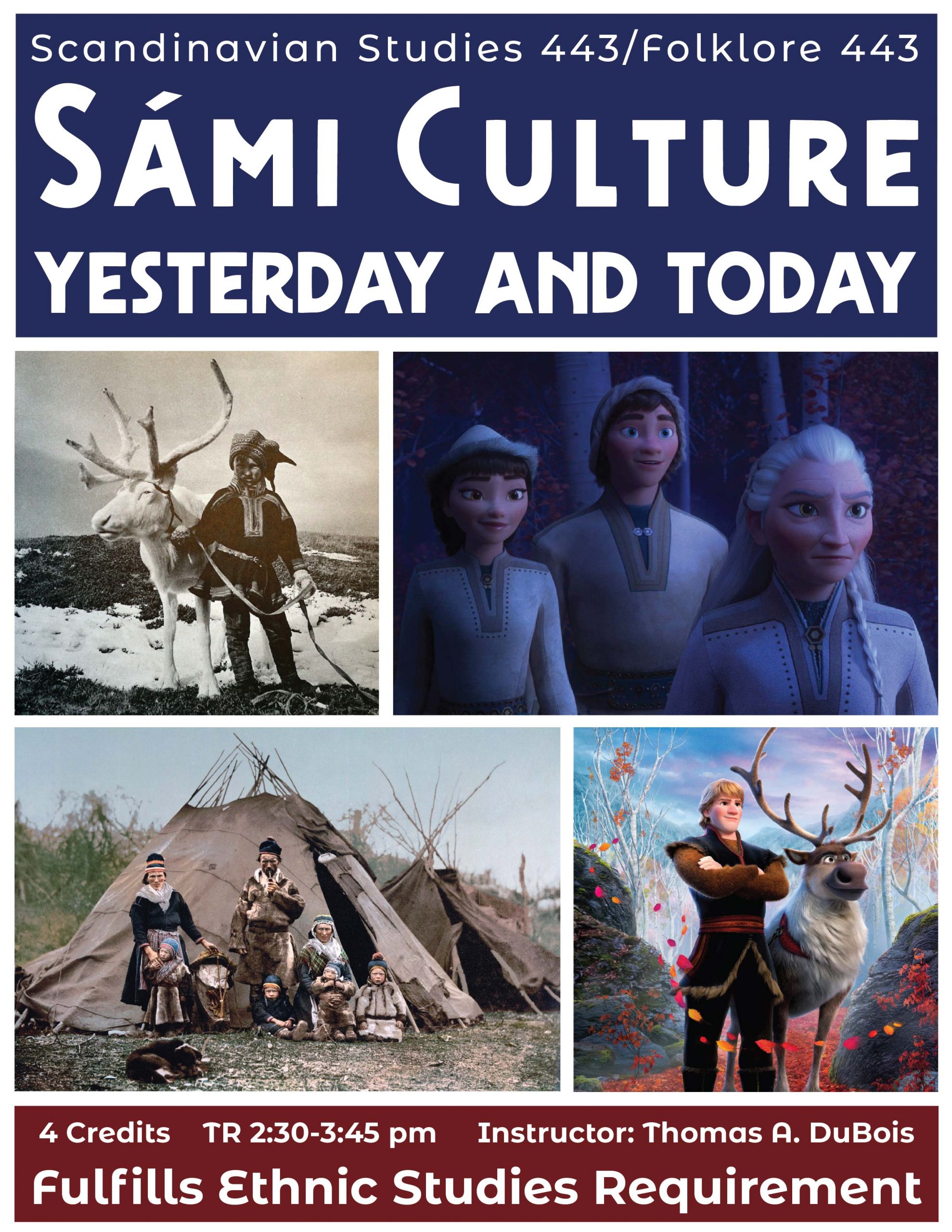Featured Fall Course!

SCAND ST 438
Sexual Politics in Scandinavia
The Nordic countries are known for being some of the most egalitarian and sexually open countries in the world. In this course we will explore how they have achieved this reputation, focusing on a variety of sources since the Moral Debates of the 1880s. We will discuss literary works, films, art, television, and critical articles to explore the ways in which Nordic societies and cultures perceive and understand gender and sexuality. We will also complicate some of myths regarding sexuality in the Nordic countries and explore how gender and sexuality are intersected with race, ethnicity, social class, and the rhetoric of the welfare state.
This is an accordion element with a series of buttons that open and close related content panels.
SCAND ST 101 – First Semester Norwegian
(4 credits)
- Section 001: MTWRF 9:55-10:45 am
- Section 002: MTWRF 1:20-2:10 pm
Course Description: Spoken and written Norwegian for students without previous knowledge.
Prerequisites: None.
SCAND ST 111 – First Semester Swedish
(4 credits)
- MTWRF 12:05-12:55 pm
Course Description: Spoken and written Swedish for students without previous knowledge.
Prerequisites: None.
SCAND ST 121 – First Semester Danish
(4 credits)
- MTWRF 11:00-11:50 am
Course Description: Spoken and written Danish for students without previous knowledge.
Prerequisites: None.
SCAND ST 131 – First Semester Finnish
(4 credits)
- MTWRF 12:05-12:55 pm
Course Description: Spoken and written Finnish for students without previous knowledge.
Prerequisites: None.
SCAND ST 201 – Second Year Norwegian
(4 credits)
- MTWR 2:25-3:15 pm Instructor: Peggy Hager
Course Description: Rapid reading of suitable texts by modern writers.
Prerequisites: SCAND ST 102 or appropriate score on the placement exam or consent of instructor.
SCAND ST 211 – Second Year Swedish
(4 credits)
- MTWR 11:00-11:50 am Instructor: Liina-Ly Roos
Course Description: Reading of selections from Swedish writers, grammar review, and conversation.
Prerequisites: SCAND ST 112 or appropriate score on the placement exam or consent of instructor.
SCAND ST 221 – Second Year Danish
(4 credits)
- MTWR 9:55-10:45 am
Prerequisites: SCAND ST 122 or appropriate score on the placement exam.
SCAND ST 251 – Readings in Norwegian Literature
(3-4 credits)
- TR 9:30-10:45 am
Course Description: Prose, poetry, and drama read in the original. Norwegian used extensively as classroom language.
Prerequisites: SCAND ST 202 or consent of instructor.
SCAND ST 261 – Readings in Swedish Literature
(3 credits)
- MWF 12:05-12:55 pm Instructor: Susan Brantly
Course Description: “Readings in Swedish Literature” is both a language course and a literature course. Students should have the equivalent of two years of Swedish language and the course counts as a fifth-semester language course. We will be reading and discussing short literary texts from the 19th and 20th Centuries. All instruction is conducted in Swedish and students will improve their speaking, listening, reading, and writing skills. Required assignments include papers, translations, and presentations. Course readings will be provided.
Prerequisites: SCAND ST 212 or consent of instructor.
SCAND ST 271 – Readings in Danish Literature
(3 credits)
- MWF 11:00-11:50 am
Course Description: Prose, poetry, and drama read in the original. Danish used extensively as classroom language.
Prerequisites: SCAND ST 222 or consent of instructor.
SCAND ST 342 – Nordic Mythology
(3 credits)
- TR 1:00-2:15 pm Instructor: Scott Mellor
Course Description: Mythology, literature, ritual, traditions, medieval folklore, and religion from Nordic areas and Scandinavia.
Prerequisites: Sophomore standing.
SCAND ST 404 – Norwegian Language I
(4 credits)
- MTWR 1:20-2:10 pm
Course Description: Introduction to languages of Northern Europe not covered by other department courses (e.g., Sami, Estonian). Practice in language, accompanied by introduction to grammar, culture, and literature. Other language-related topics offered occasionally; check timetable for details.
Prerequisites: None.
SCAND ST 404 – Norwegian Language II
(4 credits)
- MTWRF 2:25-3:15 pm
Course Description: Introduction to languages of Northern Europe not covered by other department courses (e.g., Sami, Estonian). Practice in language, accompanied by introduction to grammar, culture, and literature. Other language-related topics offered occasionally; check timetable for details.
Prerequisites: None.
SCAND ST 409 – Survey Of Old Norse-Icelandic Literature
(4 credits)
- TR 11:00 am-12:15 pm Instructor: Kirsten Wolf
Objectives: The course is intended to give students an overview of Old Norse-Icelandic literature from the earliest times until the Reformation in the mid-sixteenth century. The course is a continuation of 407 Old Norse I / 408 Old Norse II and requires familiarity with Old Norse-Icelandic grammar and a basic reading knowledge of Old Norse-Icelandic.
Content: The course seeks to familiarize students with the vast body of Old Norse-Icelandic literature through a chronological study of the major literary genres: eddic poetry, skaldic poetry, religious literature (homilies, saints’ lives, biblical translations), early historical writings (Íslendingabók, Landnámabók), kings’ sagas, contemporary sagas (bishops’ sagas and Sturlunga saga), the Sagas of Icelanders, mythical heroic sagas (fornaldarsögur), and romances (riddarasögur). Following a lecture introducing each genre, representative texts will be read, translated, and analyzed in class.
Learning outcomes: By the end of the course, students will have been introduced to the various genres of Old Norse-Icelandic literature. Through translation work, they will have solidified their knowledge of Old Icelandic grammar and expanded their lexicon.
Prerequisites: Graduate student or consent of instructor or SCAND ST/MEDIEVAL 407
SCAND ST 410 – Introduction To Scandinavian Linguistics
(4 credits)
- TR 9:30-10:45 am Instructor: Kirsten Wolf
Objectives: The course is intended to give students an overview of the development of the Scandinavian languages (Danish, Norwegian, Swedish, Icelandic, and Faroese) from Proto-Germanic to modern times, focussing on phonological and morphological changes. The emphasis will be on Proto-Scandinavian (ca. 200-ca. 600), Common Scandinavian (ca. 600-ca. 1050), and Old Scandinavian (ca. 1050-1350).
Content: The course is a combination of lecture and seminar. Following a general introduction and a brief survey of the various methods of study, the development from Indo-European to Proto-Germanic will be considered. Proto-Scandinavian, Common Scandinavian, and Old Scandinavian will be treated in detail with emphasis on phonological and morphological changes. The characteristics of the five individual Scandinavian languages will be examined.
Learning outcomes: By the end of the semester, students will have a good overview of the development of the Scandinavian languages and understand the main differences between East Norse (Danish and Swedish) and West Norse (Faroese, Norwegian, and Icelandic).
Prerequisites: Graduate student or professional standing.
SCAND ST 411 – The Cultures Of Scandinavia
(1 credits)
- T 4:00-5:15 pm Instructor: Scott Mellor
Prerequisites: 5 semesters or equivalent in a Scandinavian language.
SCAND ST 424 – Nineteenth-Century Scandinavian Fiction
(3-4 credits)
- ONLINE September 8th – December 15th Instructor: Susan Brantly
Course Description: The 19th-Century generated some of Scandinavia’s best-known writers. The course begins with Romanticism and looks at Norwegian folktales, Esaias Tegner’s popular Viking tale (Frithiof’s Saga), and Hans Christian Andersen’s world-famous stories, to name but a few highlights. From there, we move to the Modern Breakthrough, perhaps the most important period in Scandinavian literary history, during which writers were urged to take up current issues for public debate and let science be their inspiration. Internationally famous Nordic writers did just that in classics such as Ibsen’s A Doll’s House and Strindberg’s The Father. We will trace how these influential social debates about class and gender took literary form. As the century comes to a close, some writers, such as Nobel laureates Knut Hamsun and Selma Lagerlôf, react against the rationality of the Modern Breakthrough by turning to literary Decadence and Neo-Romanticism. This course on 19th-Century Scandinavian Literature is being taught entirely online.
Prerequisites: Junior status or higher and 2 years of Scandinavian language.
SCAND ST 431 – History Of Scandinavia To 1815
(3 credits)
- TR 11:00 am-12:15 pm Instructor: Scott Mellor
Course Description: Political, social, economic and cultural developments of Scandinavia through the “Viking Age” to the break-up of Sweden-Finland and Denmark-Norway; emphasis on the interplay between social and political forces and institutions and the area’s relationship with the rest of Europe.
Prerequisites: Sophomore status or higher.
SCAND ST 436 – Criminal Utopias
(3 credits)
- TR 1:00-2:15 pm Instructor: Benjamin Mier-Cruz
Prerequisites: None.
SCAND ST 438 – Sexual Politics In Scandinavia
(3 credits)
- TR 4:00-5:15 pm Instructor: Liina-Ly Roos
Course Description: The Nordic countries are known for being some of the most egalitarian and sexually open countries in the world. In this course we will explore how they have achieved this reputation, focusing on a variety of sources since the Moral Debates of the 1880s. We will discuss literary works, films, art, television, and critical articles to explore the ways in which Nordic societies and cultures perceive and understand gender and sexuality. We will also complicate some of myths regarding sexuality in the Nordic countries and explore how gender and sexuality are intersected with race, ethnicity, social class, and the rhetoric of the welfare state.
Prerequisites: Sophomore status or higher.
SCAND ST 443 – Sami Culture, Yesterday And Today
(4 credits)
- TR 2:30-3:45 pm Instructor: Thomas DuBois
Course Description: Interdisciplinary study of Sami (Lapp) people of Scandinavia past and present. Indigenous modes of expression and worldview, contemporary cultural and political activism. Extensive discussion of connections to Native American and Inuit experiences; rise of U.S. and other indigenous peoples’ movements.
Prerequisites: Junior status or consent of instructor.

